+ Open data
Open data
- Basic information
Basic information
| Entry |  | |||||||||
|---|---|---|---|---|---|---|---|---|---|---|
| Title | Cryo-EM structure of ETBR bound with BQ3020 | |||||||||
 Map data Map data | ||||||||||
 Sample Sample |
| |||||||||
 Keywords Keywords | GPCR / COMPLEX / ETB / BQ3020 / SIGNALING PROTEIN | |||||||||
| Function / homology |  Function and homology information Function and homology informationenteric smooth muscle cell differentiation / response to endothelin / aldosterone metabolic process / negative regulation of neuron maturation / chordate pharynx development / endothelin receptor activity / regulation of fever generation / vein smooth muscle contraction / positive regulation of penile erection / neuroblast migration ...enteric smooth muscle cell differentiation / response to endothelin / aldosterone metabolic process / negative regulation of neuron maturation / chordate pharynx development / endothelin receptor activity / regulation of fever generation / vein smooth muscle contraction / positive regulation of penile erection / neuroblast migration / heparin metabolic process / posterior midgut development / developmental pigmentation / epithelial fluid transport / endothelin receptor signaling pathway / podocyte differentiation / renal sodium ion absorption / response to sodium phosphate / renal sodium excretion / protein transmembrane transport / enteric nervous system development / renin secretion into blood stream / melanocyte differentiation / regulation of pH / renal albumin absorption / regulation of epithelial cell proliferation / peripheral nervous system development / positive regulation of urine volume / negative regulation of adenylate cyclase activity / vasoconstriction / type 1 angiotensin receptor binding / establishment of endothelial barrier / negative regulation of protein metabolic process / neural crest cell migration / cGMP-mediated signaling / response to pain / : / : / : / exo-alpha-sialidase / macrophage chemotaxis / peptide hormone binding / canonical Wnt signaling pathway / Transcriptional and post-translational regulation of MITF-M expression and activity / regulation of heart rate / Peptide ligand-binding receptors / calcium-mediated signaling / calcium ion transmembrane transport / Olfactory Signaling Pathway / Activation of the phototransduction cascade / response to organic cyclic compound / G beta:gamma signalling through PLC beta / Presynaptic function of Kainate receptors / Thromboxane signalling through TP receptor / G protein-coupled acetylcholine receptor signaling pathway / G-protein activation / Activation of G protein gated Potassium channels / Inhibition of voltage gated Ca2+ channels via Gbeta/gamma subunits / Prostacyclin signalling through prostacyclin receptor / Glucagon signaling in metabolic regulation / G beta:gamma signalling through CDC42 / G beta:gamma signalling through BTK / ADP signalling through P2Y purinoceptor 12 / Sensory perception of sweet, bitter, and umami (glutamate) taste / Synthesis, secretion, and inactivation of Glucagon-like Peptide-1 (GLP-1) / photoreceptor disc membrane / Glucagon-type ligand receptors / Adrenaline,noradrenaline inhibits insulin secretion / Vasopressin regulates renal water homeostasis via Aquaporins / G alpha (z) signalling events / vasodilation / Glucagon-like Peptide-1 (GLP1) regulates insulin secretion / cellular response to catecholamine stimulus / ADORA2B mediated anti-inflammatory cytokines production / sensory perception of taste / ADP signalling through P2Y purinoceptor 1 / G beta:gamma signalling through PI3Kgamma / adenylate cyclase-activating dopamine receptor signaling pathway / Cooperation of PDCL (PhLP1) and TRiC/CCT in G-protein beta folding / GPER1 signaling / cellular response to prostaglandin E stimulus / Inactivation, recovery and regulation of the phototransduction cascade / G-protein beta-subunit binding / heterotrimeric G-protein complex / G alpha (12/13) signalling events / extracellular vesicle / signaling receptor complex adaptor activity / Thrombin signalling through proteinase activated receptors (PARs) / GTPase binding / retina development in camera-type eye / nervous system development / Ca2+ pathway / phospholipase C-activating G protein-coupled receptor signaling pathway / positive regulation of cytosolic calcium ion concentration / gene expression / G alpha (i) signalling events / fibroblast proliferation / cellular response to lipopolysaccharide / G alpha (s) signalling events / G alpha (q) signalling events Similarity search - Function | |||||||||
| Biological species |  Homo sapiens (human) / Homo sapiens (human) /  | |||||||||
| Method | single particle reconstruction / cryo EM / Resolution: 3.0 Å | |||||||||
 Authors Authors | Hou JY / Liu SH / Wu LJ / Liu ZJ / Hua T | |||||||||
| Funding support | 1 items
| |||||||||
 Citation Citation |  Journal: Cell Discov / Year: 2024 Journal: Cell Discov / Year: 2024Title: Structural basis of antagonist selectivity in endothelin receptors. Authors: Junyi Hou / Shenhui Liu / Xiaodan Zhang / Guowei Tu / Lijie Wu / Yijie Zhang / Hao Yang / Xiangcheng Li / Junlin Liu / Longquan Jiang / Qiwen Tan / Fang Bai / Zhijie Liu / Changhong Miao / Tian Hua / Zhe Luo /  Abstract: Endothelins and their receptors, ET and ET, play vital roles in maintaining vascular homeostasis. Therapeutically targeting endothelin receptors, particularly through ET antagonists, has shown ...Endothelins and their receptors, ET and ET, play vital roles in maintaining vascular homeostasis. Therapeutically targeting endothelin receptors, particularly through ET antagonists, has shown efficacy in treating pulmonary arterial hypertension (PAH) and other cardiovascular- and renal-related diseases. Here we present cryo-electron microscopy structures of ET in complex with two PAH drugs, macitentan and ambrisentan, along with zibotentan, a selective ET antagonist, respectively. Notably, a specialized anti-ET antibody facilitated the structural elucidation. These structures, together with the active-state structures of ET-1-bound ET and ET, and the agonist BQ3020-bound ET, in complex with G, unveil the molecular basis of agonist/antagonist binding modes in endothelin receptors. Key residues that confer antagonist selectivity to endothelin receptors were identified along with the activation mechanism of ET. Furthermore, our results suggest that ECL2 in ET can serve as an epitope for antibody-mediated receptor antagonism. Collectively, these insights establish a robust theoretical framework for the rational design of small-molecule drugs and antibodies with selective activity against endothelin receptors. | |||||||||
| History |
|
- Structure visualization
Structure visualization
| Supplemental images |
|---|
- Downloads & links
Downloads & links
-EMDB archive
| Map data |  emd_38702.map.gz emd_38702.map.gz | 56.8 MB |  EMDB map data format EMDB map data format | |
|---|---|---|---|---|
| Header (meta data) |  emd-38702-v30.xml emd-38702-v30.xml emd-38702.xml emd-38702.xml | 19.9 KB 19.9 KB | Display Display |  EMDB header EMDB header |
| FSC (resolution estimation) |  emd_38702_fsc.xml emd_38702_fsc.xml | 8.4 KB | Display |  FSC data file FSC data file |
| Images |  emd_38702.png emd_38702.png | 47.4 KB | ||
| Filedesc metadata |  emd-38702.cif.gz emd-38702.cif.gz | 6.6 KB | ||
| Others |  emd_38702_half_map_1.map.gz emd_38702_half_map_1.map.gz emd_38702_half_map_2.map.gz emd_38702_half_map_2.map.gz | 59.4 MB 59.4 MB | ||
| Archive directory |  http://ftp.pdbj.org/pub/emdb/structures/EMD-38702 http://ftp.pdbj.org/pub/emdb/structures/EMD-38702 ftp://ftp.pdbj.org/pub/emdb/structures/EMD-38702 ftp://ftp.pdbj.org/pub/emdb/structures/EMD-38702 | HTTPS FTP |
-Validation report
| Summary document |  emd_38702_validation.pdf.gz emd_38702_validation.pdf.gz | 769.6 KB | Display |  EMDB validaton report EMDB validaton report |
|---|---|---|---|---|
| Full document |  emd_38702_full_validation.pdf.gz emd_38702_full_validation.pdf.gz | 769.1 KB | Display | |
| Data in XML |  emd_38702_validation.xml.gz emd_38702_validation.xml.gz | 16 KB | Display | |
| Data in CIF |  emd_38702_validation.cif.gz emd_38702_validation.cif.gz | 20.5 KB | Display | |
| Arichive directory |  https://ftp.pdbj.org/pub/emdb/validation_reports/EMD-38702 https://ftp.pdbj.org/pub/emdb/validation_reports/EMD-38702 ftp://ftp.pdbj.org/pub/emdb/validation_reports/EMD-38702 ftp://ftp.pdbj.org/pub/emdb/validation_reports/EMD-38702 | HTTPS FTP |
-Related structure data
| Related structure data | 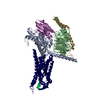 8xveMC 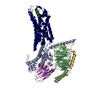 8xvhC 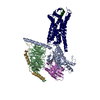 8xviC 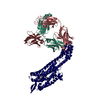 8xvjC 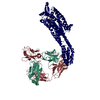 8xvkC 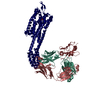 8xvlC M: atomic model generated by this map C: citing same article ( |
|---|---|
| Similar structure data | Similarity search - Function & homology  F&H Search F&H Search |
- Links
Links
| EMDB pages |  EMDB (EBI/PDBe) / EMDB (EBI/PDBe) /  EMDataResource EMDataResource |
|---|---|
| Related items in Molecule of the Month |
- Map
Map
| File |  Download / File: emd_38702.map.gz / Format: CCP4 / Size: 64 MB / Type: IMAGE STORED AS FLOATING POINT NUMBER (4 BYTES) Download / File: emd_38702.map.gz / Format: CCP4 / Size: 64 MB / Type: IMAGE STORED AS FLOATING POINT NUMBER (4 BYTES) | ||||||||||||||||||||||||||||||||||||
|---|---|---|---|---|---|---|---|---|---|---|---|---|---|---|---|---|---|---|---|---|---|---|---|---|---|---|---|---|---|---|---|---|---|---|---|---|---|
| Projections & slices | Image control
Images are generated by Spider. | ||||||||||||||||||||||||||||||||||||
| Voxel size | X=Y=Z: 1.04 Å | ||||||||||||||||||||||||||||||||||||
| Density |
| ||||||||||||||||||||||||||||||||||||
| Symmetry | Space group: 1 | ||||||||||||||||||||||||||||||||||||
| Details | EMDB XML:
|
-Supplemental data
- Sample components
Sample components
-Entire : Complex of protein Gsq with ETB and BQ3020
| Entire | Name: Complex of protein Gsq with ETB and BQ3020 |
|---|---|
| Components |
|
-Supramolecule #1: Complex of protein Gsq with ETB and BQ3020
| Supramolecule | Name: Complex of protein Gsq with ETB and BQ3020 / type: complex / ID: 1 / Parent: 0 / Macromolecule list: all |
|---|---|
| Source (natural) | Organism:  Homo sapiens (human) Homo sapiens (human) |
-Macromolecule #1: Isoform Gnas-2 of Guanine nucleotide-binding protein G(s) subunit...
| Macromolecule | Name: Isoform Gnas-2 of Guanine nucleotide-binding protein G(s) subunit alpha isoforms short type: protein_or_peptide / ID: 1 / Number of copies: 1 / Enantiomer: LEVO |
|---|---|
| Source (natural) | Organism:  Homo sapiens (human) Homo sapiens (human) |
| Molecular weight | Theoretical: 30.464314 KDa |
| Recombinant expression | Organism:  |
| Sequence | String: HHHHHHENLY FQGNSKTEDQ RNEEKAQREA NKKIEKQLQK DKQVYRATHR LLLLGADNSG KSTIVKQMRI LHGGSGGSGG TSGIFETKF QVDKVNFHMF DVGGQRDERR KWIQCFNDVT AIIFVVDSSD YNRLQEALNL FKSIWNNRWL RTISVILFLN K QDLLAEKV ...String: HHHHHHENLY FQGNSKTEDQ RNEEKAQREA NKKIEKQLQK DKQVYRATHR LLLLGADNSG KSTIVKQMRI LHGGSGGSGG TSGIFETKF QVDKVNFHMF DVGGQRDERR KWIQCFNDVT AIIFVVDSSD YNRLQEALNL FKSIWNNRWL RTISVILFLN K QDLLAEKV LAGKSKIEDY FPEFARYTTP EDATPEPGED PRVTRAKYFI RDEFLRISTA SGDGRHYCYP HFTCAVDTEN AR RIFNDCK DIILQMNLRE YNLV |
-Macromolecule #2: Guanine nucleotide-binding protein G(I)/G(S)/G(T) subunit beta-1
| Macromolecule | Name: Guanine nucleotide-binding protein G(I)/G(S)/G(T) subunit beta-1 type: protein_or_peptide / ID: 2 / Number of copies: 1 / Enantiomer: LEVO |
|---|---|
| Source (natural) | Organism:  Homo sapiens (human) Homo sapiens (human) |
| Molecular weight | Theoretical: 38.045629 KDa |
| Recombinant expression | Organism:  |
| Sequence | String: IGRARGFSEL DQLRQEAEQL KNQIRDARKA CADATLSQIT NNIDPVGRIQ MRTRRTLRGH LAKIYAMHWG TDSRLLVSAS QDGKLIIWD SYTTNKVHAI PLRSSWVMTC AYAPSGNYVA CGGLDNICSI YNLKTREGNV RVSRELAGHT GYLSCCRFLD D NQIVTSSG ...String: IGRARGFSEL DQLRQEAEQL KNQIRDARKA CADATLSQIT NNIDPVGRIQ MRTRRTLRGH LAKIYAMHWG TDSRLLVSAS QDGKLIIWD SYTTNKVHAI PLRSSWVMTC AYAPSGNYVA CGGLDNICSI YNLKTREGNV RVSRELAGHT GYLSCCRFLD D NQIVTSSG DTTCALWDIE TGQQTTTFTG HTGDVMSLSL APDTRLFVSG ACDASAKLWD VREGMCRQTF TGHESDINAI CF FPNGNAF ATGSDDATCR LFDLRADQEL MTYSHDNIIC GITSVSFSKS GRLLLAGYDD FNCNVWDALK ADRAGVLAGH DNR VSCLGV TDDGMAVATG SWDSFLKIWN UniProtKB: Guanine nucleotide-binding protein G(I)/G(S)/G(T) subunit beta-1 |
-Macromolecule #3: Guanine nucleotide-binding protein G(I)/G(S)/G(O) subunit gamma-2
| Macromolecule | Name: Guanine nucleotide-binding protein G(I)/G(S)/G(O) subunit gamma-2 type: protein_or_peptide / ID: 3 / Number of copies: 1 / Enantiomer: LEVO |
|---|---|
| Source (natural) | Organism:  Homo sapiens (human) Homo sapiens (human) |
| Molecular weight | Theoretical: 7.861143 KDa |
| Recombinant expression | Organism:  |
| Sequence | String: MASNNTASIA QARKLVEQLK MEANIDRIKV SKAAADLMAY CEAHAKEDPL LTPVPASENP FREKKFFCAI L UniProtKB: Guanine nucleotide-binding protein G(I)/G(S)/G(O) subunit gamma-2 |
-Macromolecule #4: Nanobody 35
| Macromolecule | Name: Nanobody 35 / type: protein_or_peptide / ID: 4 / Number of copies: 1 / Enantiomer: LEVO |
|---|---|
| Source (natural) | Organism:  |
| Molecular weight | Theoretical: 17.057271 KDa |
| Recombinant expression | Organism:  |
| Sequence | String: MKYLLPTAAA GLLLLAAQPA MAMQVQLQES GGGLVQPGGS LRLSCAASGF TFSNYKMNWV RQAPGKGLEW VSDISQSGAS ISYTGSVKG RFTISRDNAK NTLYLQMNSL KPEDTAVYYC ARCPAPFTRD CFDVTSTTYA YRGQGTQVTV SSHHHHHH |
-Macromolecule #5: BQ3020
| Macromolecule | Name: BQ3020 / type: protein_or_peptide / ID: 5 / Number of copies: 1 / Enantiomer: LEVO |
|---|---|
| Source (natural) | Organism:  Homo sapiens (human) Homo sapiens (human) |
| Molecular weight | Theoretical: 1.966302 KDa |
| Recombinant expression | Organism:  Homo sapiens (human) Homo sapiens (human) |
| Sequence | String: LMDKEAVYFA HLDIIW |
-Macromolecule #6: Exo-alpha-sialidase,Endothelin receptor type B
| Macromolecule | Name: Exo-alpha-sialidase,Endothelin receptor type B / type: protein_or_peptide / ID: 6 / Number of copies: 1 / Enantiomer: LEVO / EC number: exo-alpha-sialidase |
|---|---|
| Source (natural) | Organism:  Homo sapiens (human) Homo sapiens (human) |
| Molecular weight | Theoretical: 94.123805 KDa |
| Recombinant expression | Organism:  |
| Sequence | String: MKTIIALSYI FCLVFADYKD DDDAGRAVEG AVKTEPVDLF HPGFLNSSNY RIPALFKTKE GTLIASIDAR RHGGADAPNN DIDTAVRRS EDGGKTWDEG QIIMDYPDKS SVIDTTLIQD DETGRIFLLV THFPSKYGFW NAGLGSGFKN IDGKEYLCLY D SSGKEFTV ...String: MKTIIALSYI FCLVFADYKD DDDAGRAVEG AVKTEPVDLF HPGFLNSSNY RIPALFKTKE GTLIASIDAR RHGGADAPNN DIDTAVRRS EDGGKTWDEG QIIMDYPDKS SVIDTTLIQD DETGRIFLLV THFPSKYGFW NAGLGSGFKN IDGKEYLCLY D SSGKEFTV RENVVYDKDS NKTEYTTNAL GDLFKNGTKI DNINSSTAPL KAKGTSYINL VYSDDDGKTW SEPQNINFQV KK DWMKFLG IAPGRGIQIK NGEHKGRIVV PVYYTNEKGK QSSAVIYSDD SGKNWTIGES PNDNRKLENG KIINSKTLSD DAP QLTECQ VVEMPNGQLK LFMRNLSGYL NIATSFDGGA TWDETVEKDT NVLEPYCQLS VINYSQKVDG KDAVIFSNPN ARSR SNGTV RIGLINQVGT YENGEPKYEF DWKYNKLVKP GYYAYSCLTE LSNGNIGLLY EGTPSEEMSY IEMNLKYLES GANKA PAEV PKGDRTAGSP PRTISPPPCQ GPIEIKETFK YINTVVSCLV FVLGIIGNST LLRIIYKNKC MRNGPNILIA SLALGD LLH IVIDIPINVY KLLAEDWPFG AEMCKLVPFI QKASVGITVL SLCALSIDRY RAVASWSRIK GIGVPKWTAV EIVLIWV VS VVLAVPEAIG FDIITMDYKG SYLRICLLHP VQKTAFMQFY KTAKDWWLFS FYFCLPLAIT AFFYTLMTCE MLRKKSGM Q IALNDHLKQR REVAKTVFCL VLVFALCWLP LHLSRILKLT LYNQNDPNRC ELLSFLLVLD YIGINMASLN SCINPIALY LVSKRFKNCF KSCLCCWCQL EVLFQGPHHH HHHHHHH UniProtKB: exo-alpha-sialidase, Endothelin receptor type B |
-Experimental details
-Structure determination
| Method | cryo EM |
|---|---|
 Processing Processing | single particle reconstruction |
| Aggregation state | particle |
- Sample preparation
Sample preparation
| Buffer | pH: 7.4 |
|---|---|
| Vitrification | Cryogen name: ETHANE |
- Electron microscopy
Electron microscopy
| Microscope | FEI TITAN KRIOS |
|---|---|
| Image recording | Film or detector model: FEI FALCON IV (4k x 4k) / Average electron dose: 60.0 e/Å2 |
| Electron beam | Acceleration voltage: 300 kV / Electron source:  FIELD EMISSION GUN FIELD EMISSION GUN |
| Electron optics | Illumination mode: FLOOD BEAM / Imaging mode: BRIGHT FIELD / Nominal defocus max: 2.0 µm / Nominal defocus min: 1.0 µm |
| Experimental equipment |  Model: Titan Krios / Image courtesy: FEI Company |
 Movie
Movie Controller
Controller









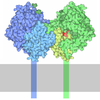


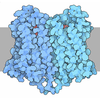
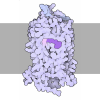



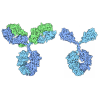




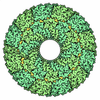





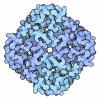
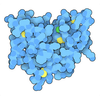




 Z (Sec.)
Z (Sec.) Y (Row.)
Y (Row.) X (Col.)
X (Col.)





















